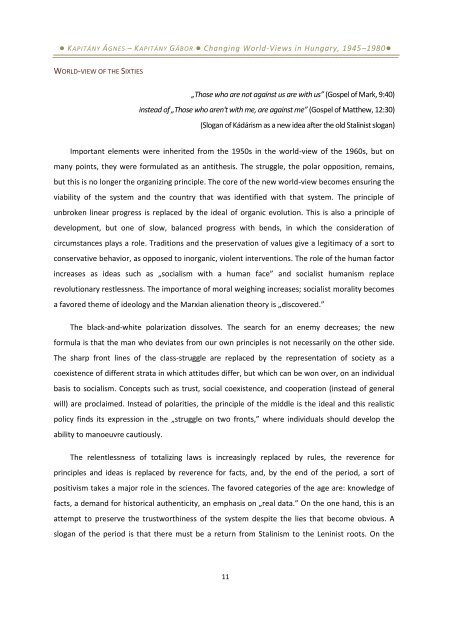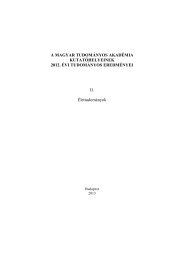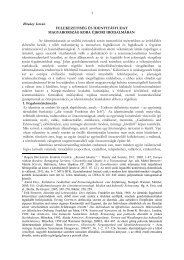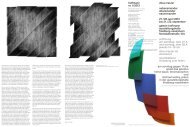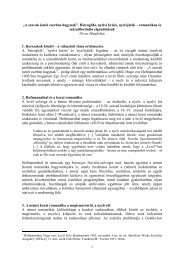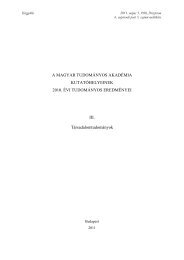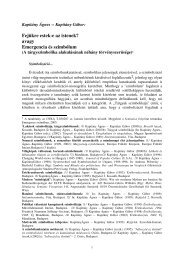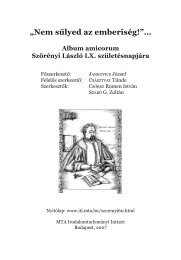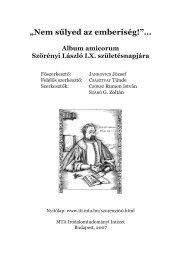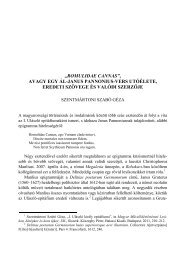symbolic elements of everyday culture - MTA Szociológiai ...
symbolic elements of everyday culture - MTA Szociológiai ...
symbolic elements of everyday culture - MTA Szociológiai ...
Create successful ePaper yourself
Turn your PDF publications into a flip-book with our unique Google optimized e-Paper software.
● KAPITÁNY ÁGNES – KAPITÁNY GÁBOR ● Changing World-Views in Hungary, 1945–1980●<br />
WORLD-VIEW OF THE SIXTIES<br />
„Those who are not against us are with us” (Gospel <strong>of</strong> Mark, 9:40)<br />
instead <strong>of</strong> „Those who aren't with me, are against me” (Gospel <strong>of</strong> Matthew, 12:30)<br />
(Slogan <strong>of</strong> Kádárism as a new idea after the old Stalinist slogan)<br />
Important <strong>elements</strong> were inherited from the 1950s in the world-view <strong>of</strong> the 1960s, but on<br />
many points, they were formulated as an antithesis. The struggle, the polar opposition, remains,<br />
but this is no longer the organizing principle. The core <strong>of</strong> the new world-view becomes ensuring the<br />
viability <strong>of</strong> the system and the country that was identified with that system. The principle <strong>of</strong><br />
unbroken linear progress is replaced by the ideal <strong>of</strong> organic evolution. This is also a principle <strong>of</strong><br />
development, but one <strong>of</strong> slow, balanced progress with bends, in which the consideration <strong>of</strong><br />
circumstances plays a role. Traditions and the preservation <strong>of</strong> values give a legitimacy <strong>of</strong> a sort to<br />
conservative behavior, as opposed to inorganic, violent interventions. The role <strong>of</strong> the human factor<br />
increases as ideas such as „socialism with a human face” and socialist humanism replace<br />
revolutionary restlessness. The importance <strong>of</strong> moral weighing increases; socialist morality becomes<br />
a favored theme <strong>of</strong> ideology and the Marxian alienation theory is „discovered.”<br />
The black-and-white polarization dissolves. The search for an enemy decreases; the new<br />
formula is that the man who deviates from our own principles is not necessarily on the other side.<br />
The sharp front lines <strong>of</strong> the class-struggle are replaced by the representation <strong>of</strong> society as a<br />
coexistence <strong>of</strong> different strata in which attitudes differ, but which can be won over, on an individual<br />
basis to socialism. Concepts such as trust, social coexistence, and cooperation (instead <strong>of</strong> general<br />
will) are proclaimed. Instead <strong>of</strong> polarities, the principle <strong>of</strong> the middle is the ideal and this realistic<br />
policy finds its expression in the „struggle on two fronts,” where individuals should develop the<br />
ability to manoeuvre cautiously.<br />
The relentlessness <strong>of</strong> totalizing laws is increasingly replaced by rules, the reverence for<br />
principles and ideas is replaced by reverence for facts, and, by the end <strong>of</strong> the period, a sort <strong>of</strong><br />
positivism takes a major role in the sciences. The favored categories <strong>of</strong> the age are: knowledge <strong>of</strong><br />
facts, a demand for historical authenticity, an emphasis on „real data.” On the one hand, this is an<br />
attempt to preserve the trustworthiness <strong>of</strong> the system despite the lies that become obvious. A<br />
slogan <strong>of</strong> the period is that there must be a return from Stalinism to the Leninist roots. On the<br />
11


